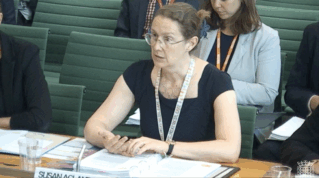New skills minister Luke Hall has backed a proposal to train industry professionals to become “reservist” FE teachers.
The “FE lecturer reservist” trial, which looks to mimic the armed forces reservist model, will initially recruit automotive technicians and engineers across the West Midlands to undertake a short teaching course, and then be called up to support FE colleges while continuing their industry role.
It is designed to address high teacher vacancy rates in further education as well as skills shortages in the automotive sector.
Developers of the pilot, including the Institute of the Motor Industry (IMI) and Warwick Manufacturing Group (WMG), hope to have it up and running before the general election or the next academic year, whichever comes first.
During his first education questions session as skills minister in parliament this week, Hall praised the concept of the scheme and pledged to visit the pilot once it has launched. He attended a roundtable last week to discuss the trial with regional employers, colleges and training providers.
“We had really positive discussions about the exciting lecturer reservist pilot that will run in the West Midlands, bringing together regional employers, colleges and providers,” Hall said.
Recent Office for National Statistics data shows the motor trades industry (representing the automotive repair sector) has 4.1 vacancies for every 100 employees as of March 2024, the highest number of vacancies across all sectors.
The government is also concerned about the teacher recruitment and retention crisis in FE. Latest workforce figures show there were 5.4 vacancies per 100 teaching positions across the sector at the end of the 2021/22 academic year. The West Midlands had an unfilled teaching vacancy rate of 5.1 per 100.
The Department for Education took control of a teacher training scheme, called Taking Teaching Further (TTF), mid-contract last year from the Education and Training Foundation after numbers showed just over half the places available were filled. TTF aims to retrain industry professionals as full-time FE teachers.
Hayley Pells, policy lead at the IMI, said the FE lecturer reservist pilot could provide ‘bi-directional” benefits of lecturers “having closer links with industry” and reservists taking back ideas to the workplace.
“You’ve got your initial benefit of boots on the ground. We need to support our FE lecturers plus our learners need up-to-date experience of the technology that they’re going to be deployed to work on as soon as they qualify,” she said.
Benjamin Silverstone, who leads skills policy and workforce transformation at WMG and is ex-army, said the pilot was born out of a need for a “more sustainable and structured manner of enabling industry to support the FE sector”.
The pilot aims for each college involved to have at least one reservist from a company to test it out.
“It’d be quite nice if there’s a couple to get that internal consistency,” Silverstone told FE Week. “The focal point will be definitely around engineering.”
According to a briefing from last week’s roundtable, attended by Luke Hall, MP Chris Clarkson and former skills minister Robert Halfon, the pilot has the potential for a national rollout if successful.
Career changer programmes are waning after the Now Teach programme – for professionals to retrain as schoolteachers – was pulled by the government just last week.
Now Teach targeted people towards the end of their careers whereas the reservist programme is aiming to recruit motor professionals four or five years into their career who want to “give back” and develop career growth.
The nuts and bolts of the scheme
The granular details of the initiative are still unknown, but the West Midlands Combined Authority has already committed to funding an eight-week course for budding FE lecturer reservists.
After the course, the reservists’ employer and provider should agree the terms of how long and often the reservist would be needed away from work.
“It may well be that the individual is called on for their specialist capabilities to teach a module over 12 weeks or for an afternoon a week,” said Silverstone.
The roundtable briefing illustrated the rights of FE reservists, mimicking the armed forces reservists, their rights of which are enshrined in law.
If agreed by all stakeholders, FE lecturer reservists, like army reservists, could claim financial support of up to £400 per day to cover the difference between their substantive salary and the rate paid by the provider.
Small- and medium-sized enterprise employers could also claim £500 per month when their reservist employee is undertaking FE delivery.
Silverstone added that, under their proposal, “should that employer say, ‘I can’t pay you your full rate’, then the college could pay them and there’d be a top up as there is with the armed forces model”.
Miriam O’Leary, partnerships director at Colleges West Midlands, said the pilot might look completely different across the region, depending on its adoption.
“I think we’re working through the detail of how we work in practice, but we have a great deal of interest in working together to make it happen,” she told FE Week.
















Your thoughts